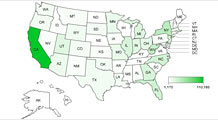More stimulus needed? Possibly
Less than a month after Obama signed a $787 billion recovery plan, there's talk of another. One leading economist puts 'at least even odds' on it.
NEW YORK (CNNMoney.com) -- Well, that didn't take long.
Less than a month after the $787 billion economic recovery package became law, Democratic leaders started talking this week about the possible need for more stimulus.
We can't say we weren't warned. In the two months before the stimulus bill was enacted, economists' estimates for how much money would be needed to boost the economy were growing by the week as conditions deteriorated quickly.
By the time Congress passed its bill, some were saying it wouldn't be sufficient to address the estimated $2 trillion decline in the country's output this year and next.
But a package larger than $800 billion wouldn't have flown politically. And some argue there isn't $787 billion worth of actual stimulus in the package. The biggest example is the $70 billion provision to provide one year of protection from the Alternative Minimum Tax for middle- and upper-middle-income families.
"The provision would provide virtually no economic stimulus. Because the patch is perennially extended, it would have no effect on behavior in 2009," the Tax Policy Center concluded. "Almost 80% of the benefits would go to the richest 20% of households, who would be least likely to spend the additional funds and generate demand."
Since President Obama signed the bill on Feb. 17, the government reported that 651,000 jobs were lost in the month of February, pushing the unemployment rate to its highest level in 25 years. Forecasters expect the rate to be at or near 9% by year's end.
"I think there are at least even odds that a third round of stimulus will be needed," Mark Zandi, chief economist of Moody's Economy.com, told CNNMoney.com. "The $787 billion was too small when enacted and the economic outlook has continued to erode since then."
After meeting with Zandi and other economists on Tuesday, House Speaker Nancy Pelosi, D-Calif., told reporters, "we have to keep the door open and see how this goes."
On Thursday, Pelosi indicated that a stimulus package isn't likely in the very near future. "I don't think you ever close the door to being prepared for what eventuality may come, but ... it's just not something that right now is in the cards."
Zandi's recommendation: "Ideally, this next round of stimulus would be in place by early 2010."
Leading House Republicans have begun to characterize the possibility of another stimulus package as proof that the one passed in February isn't working. "Now if it didn't work the first time why would it work the second time?" Rep. Paul Ryan, R-Wisc., told reporters.
But economists and Democrats say that it's much too soon to tell.
"It takes a number of months to get out in the field and get moving ... [But] that doesn't mean that we shouldn't be thinking and preparing options for the time when it may become necessary," House Appropriations Committee Chairman David Obey, D-Wisc., said Wednesday, according to Congress Daily.
Of course, the backdrop to all the debates over how much money should be injected to stabilize the financial system and the economy is the country's growing debt levels, since all the money for stimulus is borrowed.
As things stand now, the administration estimates that the deficit for fiscal year 2009 will reach $1.75 trillion, or 12.3% of gross domestic product. That's a record in dollar terms and is the highest as a share of GDP since World War II.
Many economists believe the risks to the deficit could be far greater if the government isn't aggressive enough.
"The risks are all on the side of underreacting and not on the side of overreacting," said Rebecca Blank, a senior fellow at the Brookings Institution, after the meeting between economists and House Democratic leaders on Tuesday.
Indeed, even before the $787 billion package was passed, the position of the Committee for a Responsible Federal Budget was to "err on the side of too much in deficits, just do it carefully," said Mark Goldwein, a policy analyst at the committee.
"If you're going to do another stimulus package, don't use it as a venue for pet projects or for what was thrown out of the other package because it wasn't seen as stimulative," Goldwein said.
Of course, the success of any stimulus will depend in great part on the success the Obama administration has in stabilizing the banking sector. There, too, many experts are calling for substantially more money to be injected. ![]()


